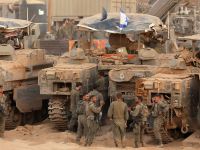Britain said on Thursday it had no plans to alter warplane patrols over Iraqi no-fly zones despite recommendations by US military commanders to reduce them because of a growing danger to pilots.
Two US generals overseeing the patrols, which enforce the decade-long ban on military flights over north and south Iraq, have recommended major changes in US and British methods because of increasing Iraqi attempts to shoot down a plane, Pentagon officials said.
A Defense Ministry spokesman in London told Reuters: "At the moment we will continue to patrol on a regular basis and respond robustly if attacked -- as has happened on a number of occasions.
"We will continue to patrol the no-fly zones. We have no plans to reduce or increase our presence in the north or south."
No allied aircraft have been shot down while patrolling the zones, which were put in place after the 1991 Gulf War to protect the Shiite Muslim population in the south and Iraqi Kurds in the north from President Saddam Hussein's military.
"There has been a fairly sustained effort over the last two years to shoot down one of our aircraft. It hasn't been successful to date but there is no denying it is a very dangerous environment to operate in and a dangerous job, but one that needs doing," the ministry spokesman said.
"We believe the no-fly zones serve a valid humanitarian purpose in preventing Saddam from using force from the air to suppress people living in those areas. It also provides us with a good idea of what is going on the ground."
Pentagon officials told Reuters that US President George W Bush's administration would consider the recommendations made by Army General Tommy Franks and Air Force General Joseph Ralston as part of a wider review on Iraqi policy.
The officials said neither Franks, head of the US Central Command, nor Ralston, the top US military officer in Europe, had suggested Iraqi planes should be allowed to resume flying in the zones.
The Central Command enforces the ban on flights over southern Iraq. Ralston is in charge of US forces based in Turkey, who patrol the northern no-fly zone.
Franks recommended reducing the number of patrols in the south but maintaining a minimum number of allied flights to keep a close watch on Iraqi troops, Pentagon officials told Reuters.
They declined to confirm a report in the Washington Post that Ralston, who is also NATO supreme commander in Europe, would prefer a halt to the flights in the north and to keep warplanes based in Turkey ready to launch retaliatory flights if Iraq uses its aircraft to harass Kurds or minority groups – LONDON (Reuters)
© 2001 Al Bawaba (www.albawaba.com)







